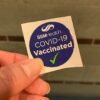AKA: Don’t post your vaccination card on social media
Go ahead and be excited about receiving a COVID-19 vaccine, but be thoughtful about how you share the news. Experts are chiming in to warn you to NOT post a photo of/with your vaccination card. Why? You could be inviting identity theft.
Seena Gressin, Attorney at the Division of Consumer & Business Education at the FTC, writes:
Your vaccination card has information on it including your full name, date of birth, where you got your vaccine, and the dates you got it. When you post it to Facebook, Instagram, or to some other social media platform, you may be handing valuable information over to someone who could use it for identity theft.
Think of it this way—identity theft works like a puzzle, made up of pieces of personal information. You don’t want to give identity thieves the pieces they need to finish the picture.
The FTC says scammers can figure out most digits of your Social Security number just by knowing the date and place of your birth. Even if you think your birthday is already “out there” on the internet in some capacity, posting a photo of your card just makes it that much more obvious. Tempting scammers with easy info isn’t a secure approach.
What if you cover up your birthday?
Even if you cover up your name and birth date if you post a pic of your vaccination card, think twice. Steve Bernas, from the Chicago Better Business Bureau told AARP members, “You don’t want to give scammers any more information because they constantly build a profile on you.” He also says it could be 10 years before they act on what is on your card.
Moreover, vaccination cards also include what type of shot(s) you received, and batch information which puts you at risk of socially engineered scams. Experts quoted in the New York Times say a scammer could pose as a government employee demanding to check your identity to inform you about medical concerns or side effects from the shot you received. Or, a scammer could use information on the card to request information that could help them gain access to other accounts—maiden names or addresses, or even find a way to trick you into paying for a future booster shot.
What CAN you share safely?
 Gressen at the FTC says, “Want to share the news about your vaccination? How about a photo of a nifty adhesive bandage on the injection site? (You can show off your tattoos and deltoids at the same time.) Or, post a photo of your white or orange vaccine sticker. The stickers are really cool.”
Gressen at the FTC says, “Want to share the news about your vaccination? How about a photo of a nifty adhesive bandage on the injection site? (You can show off your tattoos and deltoids at the same time.) Or, post a photo of your white or orange vaccine sticker. The stickers are really cool.”
Now that you’re thinking about it, it’s a great time to check your social media privacy settings. If you want to limit access to a small group of family and friends, make sure the settings are configured to avoid sharing information with strangers.
The FTC also offers tips for protecting your information against identity thieves here: How to Keep Your Personal Information Secure and


